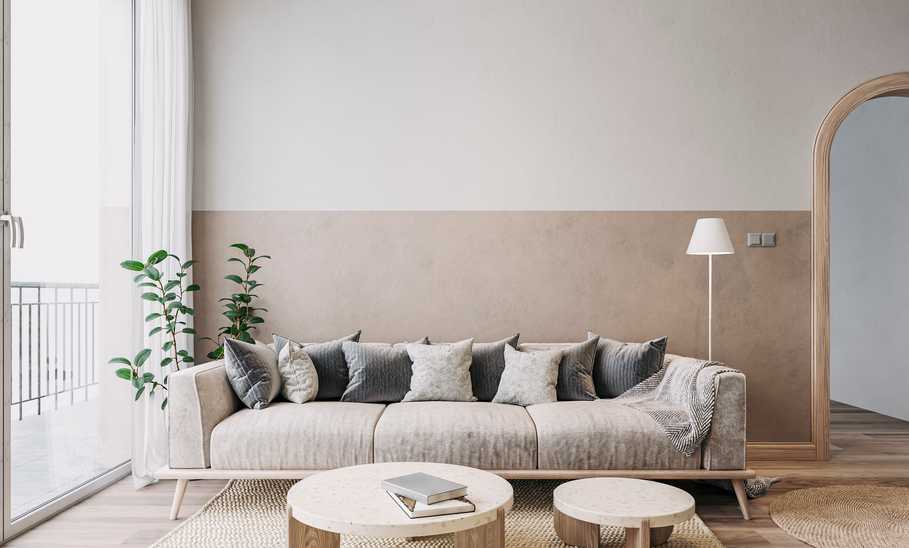Sofa Vs Couch: What’s the Difference?

Our evaluations and opinions are not influenced by our advertising relationships, but we may earn a commission from our partners’ links. This content is created by TIME Stamped, under TIME’s direction and produced in accordance with TIME’s editorial guidelines and overseen by TIME’s editorial staff. Learn more about it.
For me, home is a safe place that offers optimal comfort while being a canvas that reflects my style and aesthetic. One of the most significant pieces of furniture (and often a substantially expensive purchase) is the sofa (or couch). In many homes, they serve multiple purposes: a place to sit and visit with guests, a comfortable refuge that allows for afternoon naps and binge-watching your favorite shows, an auxiliary office, a reading nook, and a spot to snuggle with loved ones and/or the furry members of your household.
When shopping for this integral seating piece, you’ve likely considered sleeper sofas, modular sofas, and sectional sofas. You’ve also probably wondered what, if any, are the differences between a couch and a sofa. Are couches more comfortable? Why do you rarely see the term, “sleeper couch?” How do you know which is best for your space?
“Derived from the Arabic word, ‘suffah’ which refers to a platform used as a bench, sofas feature prominent backs and armrests, leaning toward formal and structured silhouettes,” says Ilaria Barion of Barion Design, Inc.
She recommends them for elegant interiors and formal living rooms because their typically polished and symmetrical design fits larger spaces while complementing modern, traditional, or formal décor.
“The term ‘couch,’ is said to come from the French word ‘couché,’ and describes a piece of furniture with no arms used for lying down,” explains Alex Bass, founder and CEO of Art Advisory & Interior Design Studio Salon 21.
According to Barion, couches are designed for “lounging in informal settings like family rooms and dens.”
Softer and cushier, comfortable couches are ideal for active families and pet-friendly environments. They’re also usually considered more versatile and casual.
“While the terms ‘couch’ and ‘sofa’ are often used interchangeably, subtle differences exist in their structure and construction,” says Maximilian Meisel, co-founder of Fenyx, a Berlin-based startup specializing in secondhand office furniture.
“Historically,” explains Meisel, “a sofa is a more formal piece of furniture, often with a uniform back and armrests on both sides.”
Couches, which tend to be less formal, don’t necessarily have arms. This makes them more versatile and conducive to a variety of settings including a TV room, patio, porch, or a bedroom.
Sofas tend to be larger and can feature additional design elements like tufting or ornate legs, says Meisel. In upholstery, tufting is a technique of creating indented patterns by tightly stitching the fabric and filling together.
“Structurally, sofas are built to encourage a more upright seating position,” Meisel says.
Couches allow for a more relaxed and reclined experience. If you live in a home that contains both a formal living room and den, you may want to keep a sofa in the former as a place to receive guests and a couch in the latter for watching television or reading.
“As a design historian, I have always seen the terms ’couch’ and ‘sofa’ used interchangeably,” says Christiane Lemieux, founder of modern luxury brand Lemieux et Cie, “but they can have different connotations depending on regional preferences, as well as subtle variations in design and usage.”
In American English, she explains, "couch" is frequently used in everyday language, while "sofa" tends to be preferred in more formal contexts or by certain individuals. For instance, some high-end American furniture manufacturers have an aversion to the word couch. “They insist upon ‘sofa,’ regardless of its shape and construction,” Lemieux tells me.
In contrast, British English speakers commonly use the term sofa and less often the term couch.
Overall, all the experts I consulted told me the difference between a couch and a sofa largely boils down to personal preference, formality, and regional usage rather than strict definitions.
“Understanding the traditional differences can help when making a choice based on your desired formality and function for the piece,” says Meisel.
Choosing the right piece depends on the space’s function and aesthetic, explains Meisel. For a formal living room or office waiting area, he suggests a sofa for its structured and polished appearance, while a casual family room may call for a couch because it offers comfort and flexibility.
Also consider the size of your room. “Sofas, being typically larger, work well in spacious areas, while couches can fit into smaller spaces more comfortably,” he says.
Angelo Surmelis, designer and founder of angelo:HOME, suggests first assessing your space.
Start by measuring your room to figure out how much space you can allocate to seating. Then, consider the room's layout and traffic flow to ensure the piece doesn’t obstruct movement, he explains. For instance, I live in a pre-war apartment in NYC. The building was built in the 1920s when rooms were smaller. Many sofas and couches won't work in my living room, let alone fit through the front door. I also live on the 5th floor of a walk-up with stairs that contain multiple 90-degree turns, making carrying larger pieces of furniture challenging and awkward. Remember that television show episode of Friends where Ross gets a new couch (“Pivot!”)?
Surmelis means assessing your space in the context of seating, not your overall life. Think about whether your new couch or sofa will be predominantly for formal entertaining, casual lounging, or a multifunctional purpose.
Bass recommends something with an L-shape as your primary sofa or couch because many people find them more comfortable. She likes a deeper cushion as well. If you’re considering a piece that won’t be used frequently, Bass tends toward something that feels more structured and feminine.
“If you're trying to decide whether you need a more ‘loungy’ option versus a more structured one, think about how frequently it is going to be used,” Bass says.
Surmelis suggests going to a store so you can sit on various options in order to select a style that not only complements your existing décor and personal taste but isn’t woefully uncomfortable to sit on. “Always test for comfort,” he says, “paying attention to the height, depth, and cushioning.”
A variety of fabrics are used on couches and sofas including leather, suede, wool, silk, and velvet as well as lower maintenance materials like microfiber and synthetic blends. “Choose upholstery materials that suit your lifestyle,” says Surmelis, “For instance, durable, easy-to-clean fabrics are ideal for families with children or pets.”
Surmelis suggests looking for features that enhance functionality, such as sleeper sofas for guests, storage compartments, or recliners for extra comfort and snoozing in front of the ball game (like my dad).
“Remember,” Surmelis says, “whether you're going for a couch, a sofa, or any other seating option, the most important thing is that it feels like home to you.”
Meisel’s current favorite is the Togo Sofa, which also has a loveseat version. He calls the Togo “truly iconic with its distinctive, low-slung design.” Originally designed by Michel Ducaroy in the 1970s for Ligne Roset, the Togo looks like a cross between a beanbag chair and a futon but much more comfortable and stylish than either of those.
Meisel says it's currently riding a wave of popularity, frequently featured in interior design magazines and appearing in many stylish and influential spaces, including the homes of celebrities like Lenny Kravitz. He chalks this up to its “unique look, array of colors, and casual, relaxed vibe which makes it a very Instagrammable piece that fits beautifully in both modern and eclectic interiors.”
You can find vintage Togo pieces on Chairish for around $3,000 and new knockoffs from a variety of manufacturers for as low as $1,000—such as this one at Wayfair.
At Ligne Roset, which is still in business, you can purchase a new one for around $8,000.
Many other couch-like furniture pieces are available, including loveseats, divans, and settees, to name a few.
Loveseats are essentially mini-sofas designed for two people. They’re perfect for small spaces like a cozy living room or a bedroom or as a companion piece to a larger sofa, explains Surmelis.
Backless sofas are called divans. They tend to be positioned against a wall with pillows for support and may feature one arm or none at all. Surmelis suggests these for “versatile seating arrangements in home offices, guest rooms or studies.”
“A settee is a smaller, delicate sofa with a wooden frame and upholstered seat and back,” explains Surmelis. Ideal for entryways, bedrooms, or as an accent piece in a living room, they usually seat two to three people.
Sectional sofas have multiple sections that can be arranged in various configurations. They often include a chaise lounge or recliner. These are great for large living rooms or open-plan spaces, providing ample seating and flexibility, explains Surmelis.
No matter which piece of furniture you pick, remember, says Surmelis, “The best spaces are those that reflect who you are and how you live. Choose what feels right for you and enjoy the process of making your space truly yours.”
The information presented here is created by TIME Stamped and overseen by TIME editorial staff. To learn more, see our About Us page.



